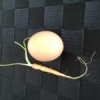-
Welcome to the eG Forums, a service of the eGullet Society for Culinary Arts & Letters. The Society is a 501(c)3 not-for-profit organization dedicated to the advancement of the culinary arts. These advertising-free forums are provided free of charge through donations from Society members. Anyone may read the forums, but to post you must create a free account.
Egyptian Food
-
Similar Content
-
- 2,289 replies
- 278,594 views
-
- 826 replies
- 80,693 views
-
Food Ethics
By Duvel,
- 24 replies
- 1,389 views
-
- 688 replies
- 63,315 views
-
Food in Art 1 2
By docsconz,
- 26 replies
- 9,668 views
-
-
Recently Browsing 0 members
- No registered users viewing this page.






Recommended Posts